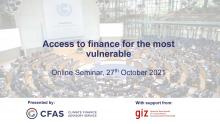
This online seminar took place in October 2021. Please check our presentation and the recording of this event on this page.
While the amount of available climate finance is growing, the current procedures for accessing resources are typically slow, complex and resource-intensive, posing major challenges to access and delivery. Even though more and more multilateral and bilateral delivery channels and initiatives for climate finance support are created, such as the Green Climate Fund (GCF), many countries, in particular the most vulnerable countries, such as of Least Developed Countries (LDCs) and Small Island Developing States (SIDS), feel excluded from the big streams of resources that are urgently needed to address the impacts of the climate crisis.
The online seminar takes a closer look at the issue of accessibility of climate finance, by exploring “access” at the national, sub-national, regional, and local level, taking into account recipients and stakeholders that are involved in funding application processes. The seminar further examines the proposition that resources are not reaching countries and that access is confined by underpinning this perception with actual numbers about the geographical and thematic distribution of climate finance. While taking into account the steps already undertaken by the UNFCCC and international community to tackle some of the issues brought forward, the seminar discusses some of the existing gaps and challenges that become apparent when analyzing the numbers and tries to formulate recommendations on how the accessibility of climate finance can be systematically increased at the national level, but also be more prominently promoted in the international debates on climate finance.
List of speakers:
- Mr. Sönke Marahrens, GIZ;
- Ms. Bertha Argueta, Germanwatch;
- Mr. Michel Köhler, the greenwerk;
- Mr. Raju Pandit, Prakriti Resources Centre.
Moderation: Mr. David Eckstein, Germanwatch

